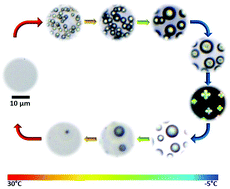Temperature-induced liquid crystal microdroplet formation in a partially miscible liquid mixture†
Abstract
Liquid-in-liquid droplets are typically generated by the partitioning of immiscible fluids, e.g. by mechanical shearing with macroscopic homogenisers or microfluidic flow focussing. In contrast, partially miscible liquids with a critical solution temperature display a temperature-dependent mixing behaviour. In this work, we demonstrate how, for a blend of methanol (MeOH) and the thermotropic liquid crystal (LC) 4-Cyano-4′-pentylbiphenyl (5CB), cooling from a miscible to an immiscible state allows the controlled formation of microdroplets. A near-room-temperature-induced phase separation leads to nucleation, growth and coalescence of mesogen-rich droplets. The size and number of the droplets is tunable on the microscopic scale by variation of temperature quench depth and cooling rate. Further cooling induces a phase transition to nematic droplets with radial configuration, well-defined sizes and stability over the course of an hour. This temperature-induced approach offers a scalable and reversible alternative to droplet formation with relevance in diagnostics, optoelectronics, materials templating and extraction processes.



 Please wait while we load your content...
Please wait while we load your content...